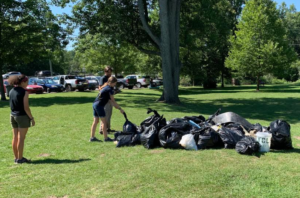OTW Hosts Successful Clinton River Cleanup!
This past Saturday, August 8, the MUCC On The Water(OTW) program partnered with Metro West Steelheaders and the Clinton River Watershed Council for the annual Clinton River Cleanup. This was the fifth OTW event of 2020, and we had a fantastic turnout from the conservation community.

We removed 614 pounds of trash from the Clinton River. This is the most trash ever removed at an OTW event!
It was a bright sunny morning as I looked at the mask covered faces of the amazing volunteers that came out to clean up the Clinton River. I was very impressed to see so many young families dedicate their time to positively impact the Clinton River Watershed. Working along the river banks as well as in the river we removed plastic bottles, cellophane wrappers, a heavy car battery and all other sorts of miscellaneous trash. In total, our 59 volunteers removed 614 pounds of trash from the Clinton River making this the largest OTW event to date.
The On the Water program is MUCC’s volunteer watershed habitat improvement program. OTW events are meant to connect people to their local water resources and have a positive impact on the health of the ecosystem. Over the course of the OTW program hundreds of volunteers across the State of Michigan have been engaged through trash cleanups and invasive species pulls. Ever since I began my AmeriCorps service in February I have reveled in the chance to work with such passionate conservationists in the fight to protect Michigan’s watersheds.
To become involved with MUCC’s future field efforts please follow this link to view the upcoming schedule of events. We look forward to seeing you out in the field!
The post OTW Hosts Successful Clinton River Cleanup! appeared first on Michigan United Conservation Clubs.
Recent Posts



